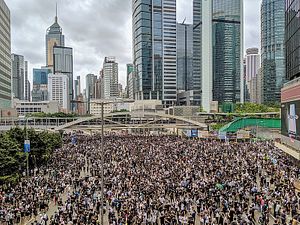Trans-Pacific View author Mercy Kuo regularly engages subject-matter experts, policy practitioners, and strategic thinkers across the globe for their diverse insights into U.S. Asia policy. This conversation with Dr. Ho-Fung Hung – Henry M. and Elizabeth P. Wiesenfeld Professor in Political Economy, Department of Sociology and the School of Advanced International Studies at the Johns Hopkins University and author of numerous publications, including The China Boom: Why China Will Not Rule the World (Columbia University Press 2015) – is the 194th in “The Trans-Pacific View Insight Series.”
Briefly explain Hong Kong’s extradition law and its implications for Chinese and foreign nationals.
The proposed amendment of the extradition law, if passed, would allow the government of mainland China to request Hong Kong to arrest “fugitives” allegedly having violated mainland Chinese laws and hand over them to mainland China. It would include not only Chinese and Hong Kong residents who were alleged of committing crimes in mainland China, but also Chinese and foreign citizens who were deemed to be threatening national security of China while they are outside China. As many fear that the Chinese government could easily fabricate criminal charges against whichever individuals they target and it is doubtful whether Hong Kong authorities could resist an extradition request from the Chinese government, this extradition amendment would amount to an extension of the mainland Chinese legal system to Hong Kong, putting Hong Kong, Chinese, and foreign citizens in the city – even when they are in transit in the airport – in jeopardy.
How might Hong Kong’s mass public demonstrations affect Hong Kong’s position as a global financial center and the Legislative Council’s decision-making process?
The extradition amendment itself is a grave threat to Hong Kong’s position as a global financial center, which is built on Hong Kong’s independent, common-law judicial system separate from the mainland legal system controlled by the CCP [Chinese Communist Party]. This legal separation makes it attractive to companies having businesses in China to base their operations in Hong Kong, where they could obtain legal protection. Many wealthy Chinese also move their wealth to Hong Kong for this legal protection. The extradition bill is making many foreign companies in Hong Kong consider moving their headquarters elsewhere in Asia. Many Hong Kong and Chinese tycoons also started moving their assets out of Hong Kong because of the extradition bill. Protesters against the amendment are protecting their own rights as well as Hong Kong’s status as a global financial center. The massive protests forced the Hong Kong government and Beijing behind it to back down to avoid bigger turmoil.
Assess Beijing’s response via official and social media commentary toward the massive mobilization of Hong Kong protesters.
At first Beijing was not shy to show its full support for the amendment. High-ranking officials, including Politburo Standing Committee member Han Zheng, openly urged Hong Kong business leaders to support the bill, even though many of them have doubts. But after the one million-strong protest on June 9 and the conflict and bloodshed on June 12, Chinese officials started to distance Beijing from the bill, saying it was [Hong Kong Chief Executive] Carrie Lam’s own initiative. It looks like Beijing was starting to retreat and preparing for some face-saving by blaming it all on Lam. In the end, Carrie Lam did announce the indefinite suspension of the amendment on June 14.
Analyze Taipei’s response toward Hong Kong’s extradition law and policy implications for Taiwan’s national sovereignty.
The crisis in Hong Kong came at an interesting time for Taiwan, where the discussion over “one country, two systems” heated up after [Chinese President] Xi Jinping called for using “one country, two systems” to attract Taiwan people in his January 1 speech. Taiwan President Tsai Ing-wen has been active in pointing out that the extradition bill and police brutality against protesters are things Taiwan’s people would face if they accepted absorption by China via “one country two systems.” The resistance and crackdown in Hong Kong reminds Taiwan people of the days when they were fighting for democracy under an authoritarian regime, and the value of freedom and sovereignty of Taiwan. Blue [KMT] candidates who were not so critical of China, like Terry Gou and Han Kuo-yu, are now pressured to openly denounce “one country, two systems” as a failure in Hong Kong. What happened in Hong Kong would ultimately benefit Tsai in the upcoming presidential election.
If the Legislative Council passes the extradition law, what would be the impact on the U.S. Hong Kong Policy Act and Hong Kong’s special status with the United States?
At the height of the extradition law debate and the protests, U.S. State Department, U.S. Chamber of Commerce, and congressional leaders all spoke out and explicitly linked the extradition bill to a U.S. reconsideration of its recognition of Hong Kong’s special trading status given by the U.S. Hong Kong Policy Act. Bipartisan Congress leaders in the U.S. reintroduced the Hong Kong Human Rights and Democracy Act on June 13 as an effort to beef up U.S. verification of Hong Kong’s autonomy and support of the Hong Kong democratic movement – such as by sanctioning individual Hong Kong officials responsible for cracking down on Hong Kong’s freedom. Now that the extradition bill was suspended but not withdrawn, and the massive protest and police brutality against protesters was made known to the world, the Hong Kong Human Rights and Democracy Act will proceed in the U.S. Congress.
Plus, the suspension of the extradition bill amidst massive protest shows that Beijing is still reluctant to apply harsher measures and risk larger bloodshed to crack down on Hong Kong like it did to Xinjiang and Tibet. This reflects that Beijing still fears the loss of Hong Kong’s special trading status as recognized by the U.S. and the international community. As such, Hong Kong will become part of the negotiation between the U.S. and China over trade and other issues. Hong Kong has become one of the main fronts of U.S.-China conflict.

































